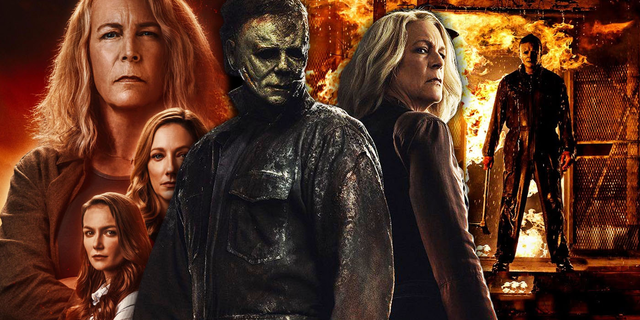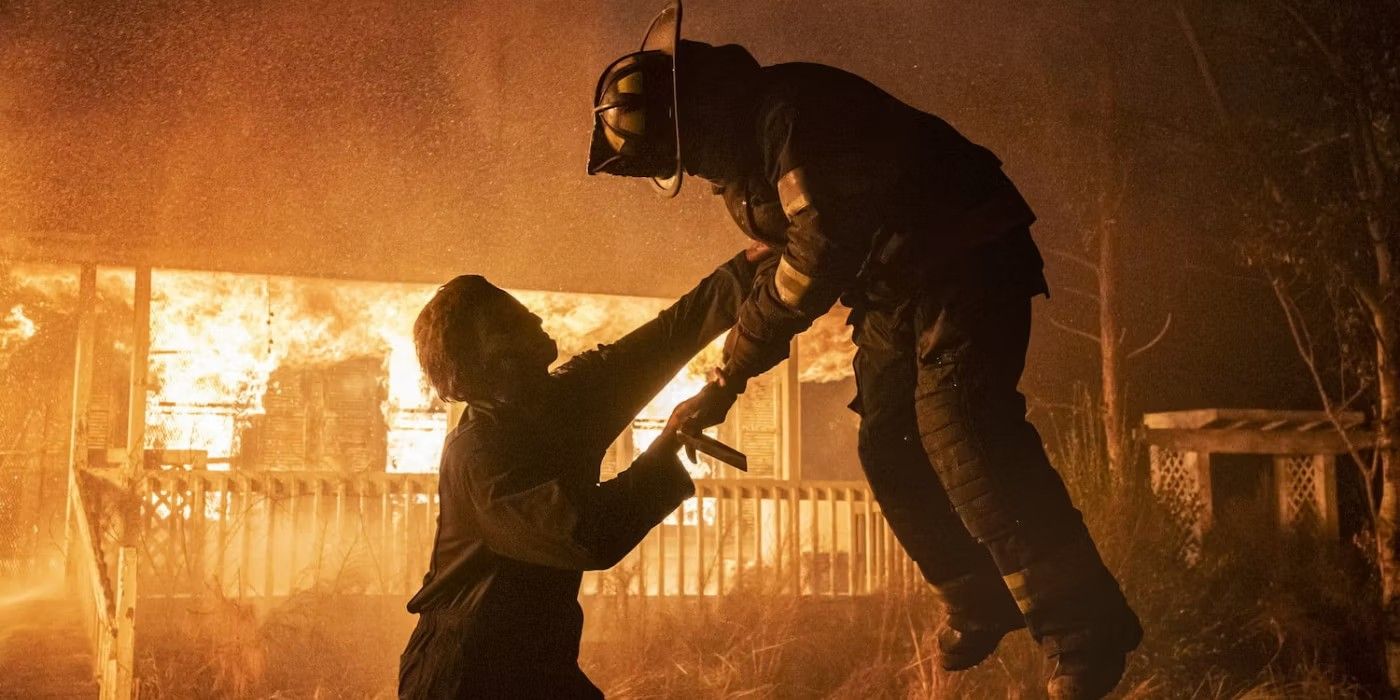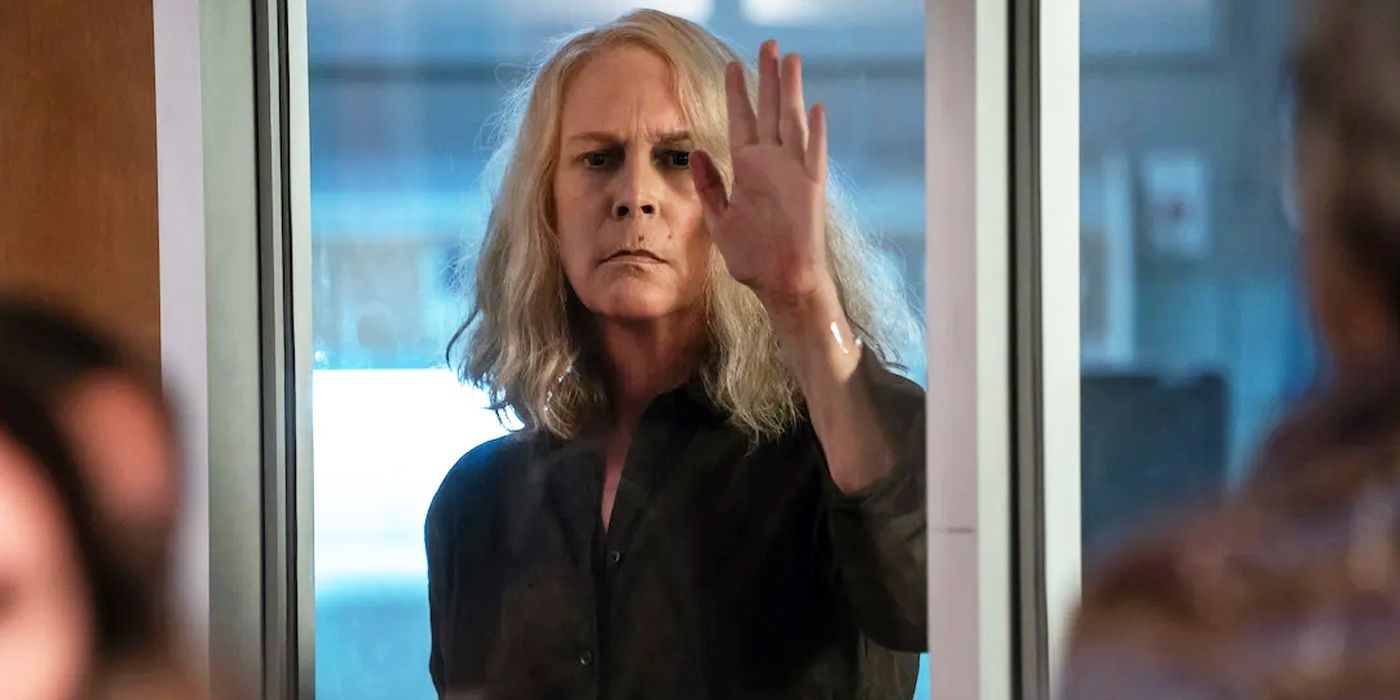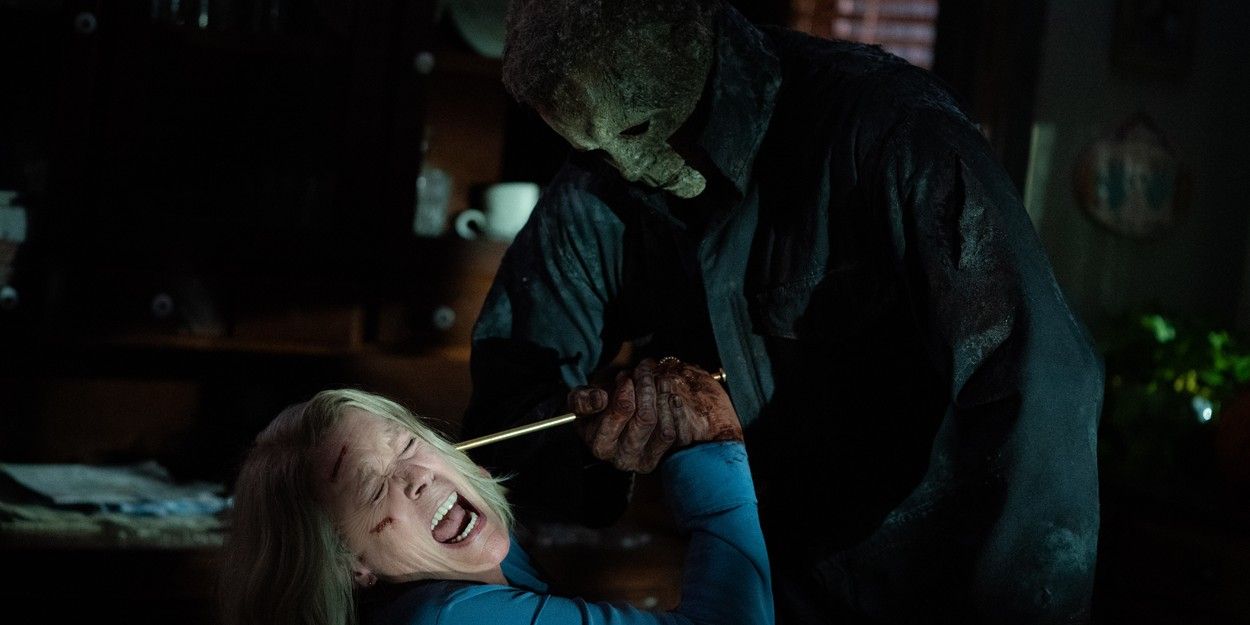The following contains spoilers for Halloween Ends, currently in theaters and streaming on the premium tiers of Peacock.
David Gordon Green's Halloween sequel trilogy is fascinating. Beginning in 2018 with the simply titled Halloween, Green and co-writer Danny McBride scrapped four decades' worth of sequels, reboots and remakes in the name of taking the whole franchise back to the roots of John Carpenter's original 1978 Halloween. The resulting film was such a tremendous success with both critics and audiences alike that Blumhouse ordered not just one but two follow-up installments from the same creative team: 2021's Halloween Kills and 2022's Halloween Ends.
While 2018's Halloween was an all-around smash, its sequels have been met with a decidedly less enthusiastic response. Both Halloween Kills and Halloween Ends divided critics and audiences, with each having its staunch detractors and supporters. Halloween Kills was a largely surface-level affair, described by franchise creator John Carpenter as the "ultimate slasher," a film that was a full 90 minutes of Michael Myers on a bloodthirsty rampage. By contrast, Halloween Ends is a much more character-rooted, emotional and thematically-driven film. But as different as these two sequels are, the truth is that Halloween Ends' deeper explorations of character and theme retroactively make Halloween Kills a better film.
The Problems With Halloween Kills
One of the biggest criticisms levied against Halloween Kills is that the film was rudderless, largely devoid of any motivation. Much like the original Halloween II in 1981, Halloween Kills picks up precisely where the previous film left off. And while this approach led to some pretty extensive narrative connections, the results were decidedly mixed in both cases. Halloween II is a film that John Carpenter infamously found to be "an abomination," and much like that sequel, Halloween Kills struggles with carving out an identity for itself.
Halloween Kills has no real story or even proper protagonist to speak of. It is quite literally just "more of the night he came home," leaving it feeling more like a B-side to 2018's Halloween and less like an actual sequel. Michael's murders continue, Jamie Lee Curtis' Laurie is hospitalized, Judy Greer's Karen and Andi Matichak's Allyson struggle with the fallout of the events of the previous film, the town of Haddonfield is terrorized, etc. As a film in its own right, taken on its own terms without considering the context of the film before it or after it, Halloween Kills falls flat.
It's also worth pointing out that the circumstances surrounding Halloween Kills' release did it no favors. Originally set for release in October 2020, the film was pushed back due to the COVID pandemic. Even by the time it was released in 2021, it was among the first crop of big-budget horror films to return to theaters. Thus, what was originally intended by David Gordon Green to be a chaotic "disruption" of a middle chapter to the trilogy suddenly had a much larger burden placed upon its shoulders.
Each Halloween Sequel Recontextualizes the Last
After the thoughtful and articulate filmmaking on display in 2018's Halloween, Halloween Kills felt like a step in the wrong direction that had critics and audiences questioning if Green and co.'s stellar first film was perhaps less intentional and more of a fluke than initially believed. In stark contrast, Halloween Ends swung the pendulum back in the exact opposite direction, doubling down on some of the most profound thematic beats from 2018's Halloween and making Halloween Kills much more affecting as a result. As the trilogy capper, Halloween Ends is able to retroactively recontextualize Halloween Kills. In giving some of the more questionable or seemingly directionless threads from Halloween Kills a much more cohesive conclusion, Halloween Ends makes Halloween Kills all the stronger.
How Halloween Ends Makes Halloween Kills Better
For an example of this, one need to look no further than the oft-derided 'evil dies tonight' storyline from Halloween Kills. The townspeople of Haddonfield, led by Anthony Michael Hall's Tommy Doyle, are galvanized into a murder-hungry mob by their fear of the seemingly unstoppable Michael Myers. In the context of Halloween Kills, it's nice to see the townspeople play more of a role in the story, but it all feels kind of pointless. It makes a general surface-level statement about mob mentality but feels largely devoid of any thematic nuance and narratively seems to exist for the sole purpose of giving Michael a bunch of people to kill throughout the runtime.
But with Halloween Ends, Green and co. bring this thread to a surprisingly poignant culmination. Picking up four years after the single-night events of 2018's Halloween and Halloween Kills, Halloween Ends depicts a Haddonfield positively hollowed out by its collective grief and rage. Michael disappeared after the events of that night and left the town with this monolithic rage and nowhere to put it. As a result, Corey's entire storyline in Halloween Ends pays off this entire idea in a profoundly affecting fashion, as he becomes the scapegoat for the town's infectious rage.
Similarly, leaving the iconic final girl and heroine of the franchise, Laurie Strode, on bedrest for the entirety of Halloween Kills felt like an odd choice at the moment. But with Halloween Ends giving it added context, this choice winds up working incredibly well. Having Laurie not face Michael in Halloween Kills and instead spend her time developing her relationship with Will Patton's Frank Hawkins pays off in spades in Halloween Ends. Now, her final confrontation with Michael feels all the more impactful, and her relationship with Frank can blossom beautifully, all because of the groundwork laid in Halloween Kills.
Even Halloween Kills' overall messiness and gleeful debauchery with Michael as a character make so much more creative sense with Halloween Ends' impending finale in mind. Green and McBride originally pitched their Halloween films as just two installments: what became 2018's Halloween and Halloween Ends. So Halloween Kills was an addition made after the fact, making it very aware of its final destination. Knowing that Halloween Ends was going to swing for a more metaphorical take on Michael Myers, it makes perfect creative sense that the creative team would want to give audiences all the Michael-fueled carnage they possibly could in Halloween Kills. Plus, maximizing his kill count in Halloween Kills makes the long-lasting traumatizing effect his disappearance has on Haddonfield in Halloween Ends all the stronger.
David Gordon Green and Danny McBride's experience with long-form serialized storytelling comes from their experience crafting incredible television series like Vice Principals and The Righteous Gemstones. Like Halloween, their work on these projects embraces genre (in this case, comedy) while sculpting stories deeply rooted in characters and the changing worlds around them. In television, creators are afforded more leniency in betting all their chips on developments that won't pay off until a few episodes down the road because those payoffs are mere weeks away. Film is a more self-contained medium, one in which each installment is expected to stand on its merits.
But in bringing this writing approach to their Halloween films, they've delivered a surprising and affecting trilogy of films. At first glance, they might seem disparate. But in actuality, each of David Gordon Green's Halloween films feeds into the next, resulting in a startling emotional and thematic throughline that culminates with profound resonance in Halloween Ends.
To see how it elevates Halloween Kills, Halloween Ends is now playing in theaters and streaming on Peacock.




